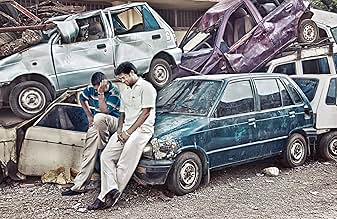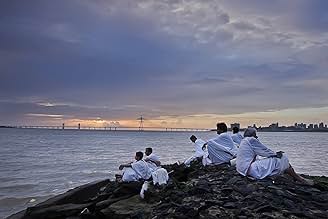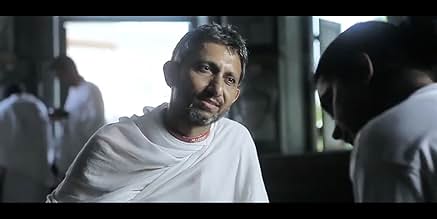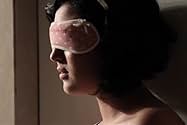AVALIAÇÃO DA IMDb
8,0/10
8,1 mil
SUA AVALIAÇÃO
O filme explora questões de identidade, justiça, beleza, significado e morte por meio de um fotógrafo experimental, um monge doente e um jovem corretor da bolsa.O filme explora questões de identidade, justiça, beleza, significado e morte por meio de um fotógrafo experimental, um monge doente e um jovem corretor da bolsa.O filme explora questões de identidade, justiça, beleza, significado e morte por meio de um fotógrafo experimental, um monge doente e um jovem corretor da bolsa.
- Direção
- Roteiristas
- Artistas
- Prêmios
- 12 vitórias e 13 indicações no total
Aydah El-Kashef
- Aliya
- (as Aida El-Kashef)
Yogesh Shah
- Doctor
- (as Dr. Yogesh Shah)
Avaliações em destaque
Anand Gandhi's first feature-length film is an intriguing and thought-provoking piece of Independent cinema; it deals with life, purpose and philosophy. Gandhi's prior experience with short films helps him direct the three disparate story lines with certain finesse; the stories shed some light on Theseus's Paradox and give a transcendent look at consequences arising from individual actions.
In Greek Legend, according to Plutarch, Theseus's ship was preserved, and the decayed parts were replaced piece by piece until no part of the original ship remained. Plutarch asks whether you would call it the same ship or not. The paradox might seem too confusing to discuss, but Anand Gandhi just uses this to connect the three plots through the theme of organ donation, questioning identity in the face of change. Rather than making a statement, Gandhi just raises interest and discusses various important philosophies and issues; having compelling arguments for and against the topics, it helps us being a part of the discussion.
The characters are likable and interesting. All the actors have done a commendable job, and Neeraj Kabi's brilliant performance as the Jain monk stands out. As the three stories go, the first one (with the blind Egyptian photographer) deals with behaviour to change, the second one (with the animal-rights supporting Jain monk) might seem more philosophically and intellectually orgasmic, but it's the third one (with a stock broker seeking justice for a kidney scam victim) which oozes with brutal honesty. The use of humour to lighten the serious tone of the movie is delightful.
The cinematography is spectacular. Rarely have I seen such breathtaking visuals in an Independent film; the shots have a certain poetic and aesthetic charm. The blend of far-off shots and sudden close-ups gives us an intimate look at the characters' lives.
The movie is really good, but far from perfection. 2 hours 20 minutes is too long for the movie; with better editing, it could have maintained the pace and momentum well. And as most movies with multiple story lines suffer from this, the characters lack enough depth and screen-time for us to invest ourselves in them. The first story, though the idea of a blind photographer is a bit far-fetched, suffers from an abrupt ending. The second story has many interesting viewpoints and arguments, but part of them seem off-the-book and pretentious; it suffers from an illogical ending too. The third story, though quite honest and absorbing, is quite messy and detours from the main theme of the movie.
From writing screenplay and dialogues for cheesy soap operas to an intellectual independent feature film, Anand Gandhi has come a long way; I guess his experience as a playwright and short-film director must have come in handy.
In Greek Legend, according to Plutarch, Theseus's ship was preserved, and the decayed parts were replaced piece by piece until no part of the original ship remained. Plutarch asks whether you would call it the same ship or not. The paradox might seem too confusing to discuss, but Anand Gandhi just uses this to connect the three plots through the theme of organ donation, questioning identity in the face of change. Rather than making a statement, Gandhi just raises interest and discusses various important philosophies and issues; having compelling arguments for and against the topics, it helps us being a part of the discussion.
The characters are likable and interesting. All the actors have done a commendable job, and Neeraj Kabi's brilliant performance as the Jain monk stands out. As the three stories go, the first one (with the blind Egyptian photographer) deals with behaviour to change, the second one (with the animal-rights supporting Jain monk) might seem more philosophically and intellectually orgasmic, but it's the third one (with a stock broker seeking justice for a kidney scam victim) which oozes with brutal honesty. The use of humour to lighten the serious tone of the movie is delightful.
The cinematography is spectacular. Rarely have I seen such breathtaking visuals in an Independent film; the shots have a certain poetic and aesthetic charm. The blend of far-off shots and sudden close-ups gives us an intimate look at the characters' lives.
The movie is really good, but far from perfection. 2 hours 20 minutes is too long for the movie; with better editing, it could have maintained the pace and momentum well. And as most movies with multiple story lines suffer from this, the characters lack enough depth and screen-time for us to invest ourselves in them. The first story, though the idea of a blind photographer is a bit far-fetched, suffers from an abrupt ending. The second story has many interesting viewpoints and arguments, but part of them seem off-the-book and pretentious; it suffers from an illogical ending too. The third story, though quite honest and absorbing, is quite messy and detours from the main theme of the movie.
From writing screenplay and dialogues for cheesy soap operas to an intellectual independent feature film, Anand Gandhi has come a long way; I guess his experience as a playwright and short-film director must have come in handy.
Ship of Theseus is a movie which we need but didn't really deserve right now. A lot of things have already been said about it, so with the risk of sounding repetitive, however I'll try not to be so, here are some of my thoughts: 1. To begin with, Anand Gandhi has made an utterly brilliant movie. The honesty, genuineness, and intent of the director is clear from the word go which is a sheer pleasure to see in an Indian filmmaker.
2. Three stories - totally different to each others in terms of mood and narration, yet so well transitioned that you don't even notice it. Two thumbs up for the screenplay and editing.
3. Utterly brilliant cinematography, a visual delight which mesmerizes you and grips you with every scene and its details that is on the screen. After I exited the theater, I couldn't believe I watched an Indian movie looking so beautiful. In fact, I can go on and on about the imagery. Well done! 4. Superb dialogues (and the use of no dialogues) - At times, zen, and other times, so passionate that you feel like talking to your alter ego, just like, the conversations in Zen and the Art of Motorcycle Maintenance. Even the humorous and satirical parts don't make you feel like they are used as punches, except a couple times maybe.
5. Acting - Top notch by the all three protagonists. Relatively good performance by the other actors as well. But the three main actors are so good you long to see more of them. And the sympathies and your connections with them find their peaks in the penultimate scene.
6. Only thing where I felt I had issue is that some scenes and conversations were finished in a hurry. While one talk about something so powerful in detail, it should be a complete conversation, whereas, at times, it appears a lot of important things were skipped (esp. in story #2). Though I didn't find too many things wrong with the conversations in story 2 and narrations in story 2 and 3, it looked to me that something was amiss, they could have talked a little more, and so on. The movie could have been even more powerful, given the premise and ideas it began with. Actually, the idea is itself so big and extensive that any less would feel like incomplete. Such as, writing about this movie in 140 characters. But I guess I shouldn't complain as it's a movie where it's very difficult to have such kind of narration as well as a speech as long as that of John Galt. Anyways, I am more than glad that such things were talked about in a movie made in India.
Bravo, Anand Gandhi and the team! I stood and clapped for you all when the movie ended in the theater.
2. Three stories - totally different to each others in terms of mood and narration, yet so well transitioned that you don't even notice it. Two thumbs up for the screenplay and editing.
3. Utterly brilliant cinematography, a visual delight which mesmerizes you and grips you with every scene and its details that is on the screen. After I exited the theater, I couldn't believe I watched an Indian movie looking so beautiful. In fact, I can go on and on about the imagery. Well done! 4. Superb dialogues (and the use of no dialogues) - At times, zen, and other times, so passionate that you feel like talking to your alter ego, just like, the conversations in Zen and the Art of Motorcycle Maintenance. Even the humorous and satirical parts don't make you feel like they are used as punches, except a couple times maybe.
5. Acting - Top notch by the all three protagonists. Relatively good performance by the other actors as well. But the three main actors are so good you long to see more of them. And the sympathies and your connections with them find their peaks in the penultimate scene.
6. Only thing where I felt I had issue is that some scenes and conversations were finished in a hurry. While one talk about something so powerful in detail, it should be a complete conversation, whereas, at times, it appears a lot of important things were skipped (esp. in story #2). Though I didn't find too many things wrong with the conversations in story 2 and narrations in story 2 and 3, it looked to me that something was amiss, they could have talked a little more, and so on. The movie could have been even more powerful, given the premise and ideas it began with. Actually, the idea is itself so big and extensive that any less would feel like incomplete. Such as, writing about this movie in 140 characters. But I guess I shouldn't complain as it's a movie where it's very difficult to have such kind of narration as well as a speech as long as that of John Galt. Anyways, I am more than glad that such things were talked about in a movie made in India.
Bravo, Anand Gandhi and the team! I stood and clapped for you all when the movie ended in the theater.
Have been more than 5 months since I saw the film. But it surely got to be a film which will stay with me forever. A film dealing with a philosophical paradox doesn't sound exciting but this film totally surprised me. The paradox of the Ship of Theseus is an underlying layer of the film which has 3 stories. The characters in the film deal with things that challenge their beliefs and in unexpected ways. The beauty is in the treatment which is effortlessly unpredictable without ever being manipulative or calculated. You feel tremendous empathy for the characters which seems to come for the filmmakers deep understanding of the human psychology and behavior unlike most films/narratives where the author/ filmmaker try to 'design' a character for the purpose of eliciting emotions. Here its all so natural that there seems no design and that is the best part about the performances. They are real as well as really intriguing. I found the character of monk played by Neeraj Kabi to be specially intriguing. His is an amazingly natural performance and yet larger than life in some ways. Sohum Shah was a revelation. For once I thought that he may have been casted in the film for being the producer but when you see the film, he was just brilliant. His performance is one which is so subdued that it took me sometime to realize how good he is. Aida who plays the photographer also delivers a delightful performance. I guess her role was the most difficult as she plays a character which one cannot normally find references in real life or even fiction and despite that she delivers such a natural performance.
What is most surprising about the film is its technical finesse. Cinematography is the best you'll see, the film is a visual treat. It took me sometime to realise that the film is set in Bombay not because its a Bombay which you rarely ever see in Bollywood films. It was later that I got to know that the film was shot on a Canon DSLR and I couldn't believe it. Sound design and mixing is also top notch something which is rare for low budget productions(In Indian context even for big budget films). The background score is absolutely mesmerising and only comes when needed. Particular mention should be made of the Naham Janami song which plays in the background during the monk story. I really believe that this film deserves a big screen experience and that is why am so happy that it is finally releasing in India otherwise most would have either not seen it or would have to see it on small screens which does not do justice to this film.
I can go and on about the film but at this point will end at this note that do not miss this film if you get an opportunity to see it. You'll thank me for this!
What is most surprising about the film is its technical finesse. Cinematography is the best you'll see, the film is a visual treat. It took me sometime to realise that the film is set in Bombay not because its a Bombay which you rarely ever see in Bollywood films. It was later that I got to know that the film was shot on a Canon DSLR and I couldn't believe it. Sound design and mixing is also top notch something which is rare for low budget productions(In Indian context even for big budget films). The background score is absolutely mesmerising and only comes when needed. Particular mention should be made of the Naham Janami song which plays in the background during the monk story. I really believe that this film deserves a big screen experience and that is why am so happy that it is finally releasing in India otherwise most would have either not seen it or would have to see it on small screens which does not do justice to this film.
I can go and on about the film but at this point will end at this note that do not miss this film if you get an opportunity to see it. You'll thank me for this!
Review #2.
Ship of Theseus is a very different cinematic experience. It moves you, it makes you think about life in a different way. The characters, the narrative don't ever leave you. Anand Gandhi is definitely a talent to look out for.
There are three different stories. Each with a different plot but same destination. The first one brings you in life of a girl who had lost her eyesight due to cornea and does photography. The second one is about a monk who should have an organ transplant. And the third one is about a stockbroker who just had a kidney transplant.
The stories instantaneously connect with you. It's hard to decide which one of the three is the best. I would say the three altogether make one of the finest movies ever made in India. And it would not be wrong to say that it is the best Indian movie of the year.
The performances are very real. Specially Neeraj Sir. The direction and cinematography are exceptional.
At last, I would like to say that It is not a usual Indian movie. Go with your brains and you'll experience something you've never experienced before.
Ship of Theseus is a very different cinematic experience. It moves you, it makes you think about life in a different way. The characters, the narrative don't ever leave you. Anand Gandhi is definitely a talent to look out for.
There are three different stories. Each with a different plot but same destination. The first one brings you in life of a girl who had lost her eyesight due to cornea and does photography. The second one is about a monk who should have an organ transplant. And the third one is about a stockbroker who just had a kidney transplant.
The stories instantaneously connect with you. It's hard to decide which one of the three is the best. I would say the three altogether make one of the finest movies ever made in India. And it would not be wrong to say that it is the best Indian movie of the year.
The performances are very real. Specially Neeraj Sir. The direction and cinematography are exceptional.
At last, I would like to say that It is not a usual Indian movie. Go with your brains and you'll experience something you've never experienced before.
I went for the movie with nil expectations though i was aware of the genre. But it impressed me beyond excellence at the end. The movie presents three stories seemingly different from one another but the way the different threads of the stories get intertwined at the end into one beautiful fabric is an absolute pleasure to the senses. As per me I perceived there were multiple layers to the story each layer contributing as an example in some way to the ship of theseus paradox. The way in which it subtly presents the fact that if something changes in us, we do not remain the same person from thereon. This change may be a change in the way we perceive the world, or a change in our belief system , or a change in our attitude towards other people. The next layer of the story is what amazed me most , which consists of bringing the three stories together to show how a human being is not just flesh and bones but comprises of ideas, emotions, beliefs etc. What makes each one of us different is our thought process, our ideas, our choices and many other things. A very simple example to state such theory could be a case of twins who share the same progeny, the some womb, the same features but end up completely different. I guess i have already said a lot, if your brain has a good appetite for thought this is the movie for you.
Você sabia?
- CuriosidadesDirector Anand Gandhi uploaded the original film and 6-hour long extra feature online in November, 2013 asking individuals or entities to edit and carve the film as a whole to bring different interpretations. He would later conduct a festival in Mumbai for the entries.
- Erros de gravação20:50 scene is unreal. Post-op eye opening is done in a dark room so as to prevent strain on eyes.
- ConexõesFeatured in The Story of Film: A New Generation (2021)
Principais escolhas
Faça login para avaliar e ver a lista de recomendações personalizadas
Detalhes
- Data de lançamento
- Países de origem
- Central de atendimento oficial
- Idiomas
- Também conhecido como
- Корабль Тесея
- Locações de filme
- Empresas de produção
- Consulte mais créditos da empresa na IMDbPro
Bilheteria
- Orçamento
- ₹ 12.000.000 (estimativa)
- Tempo de duração2 horas 20 minutos
- Cor
- Proporção
- 2.35 : 1
Contribua para esta página
Sugerir uma alteração ou adicionar conteúdo ausente























